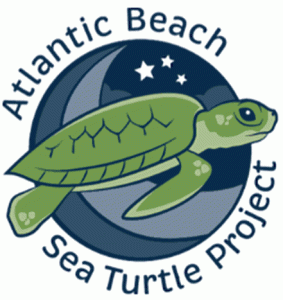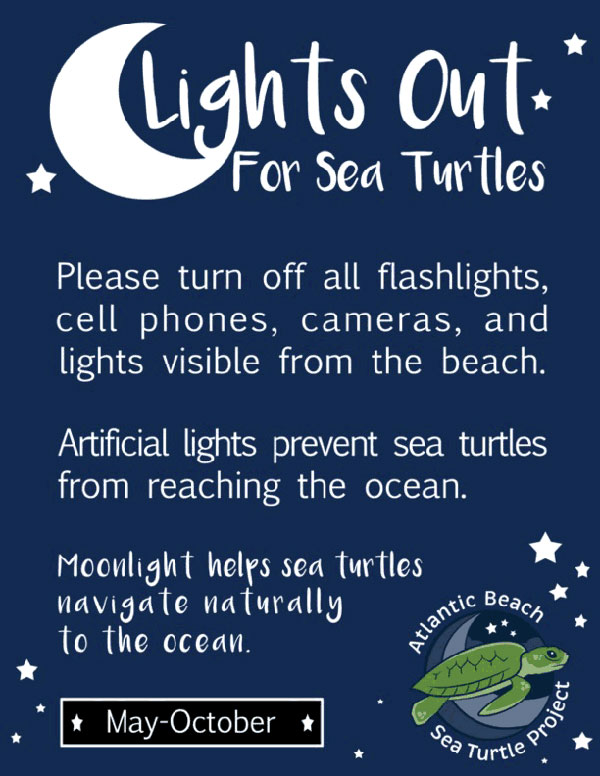
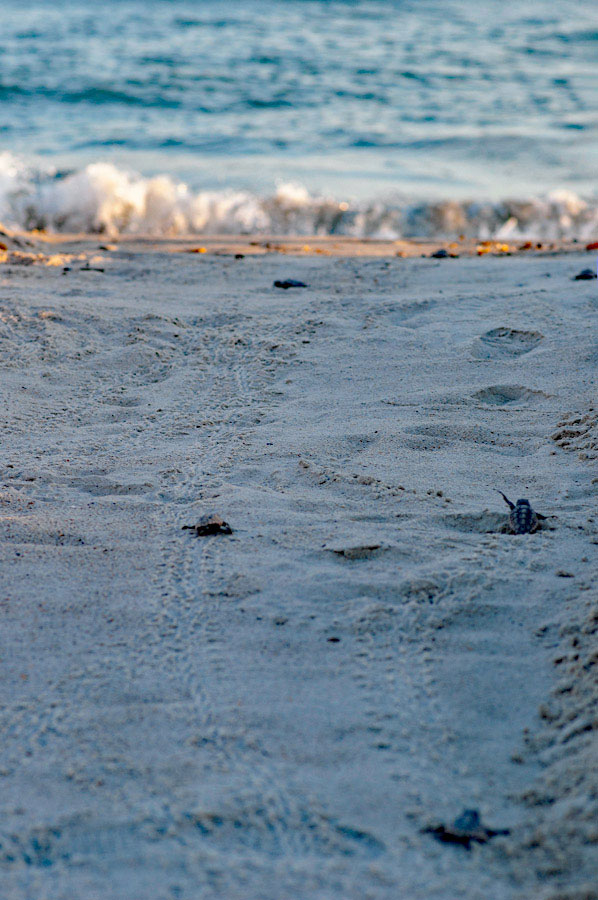
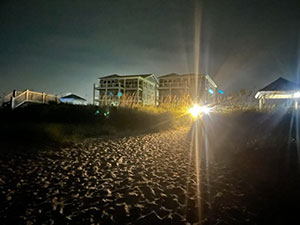
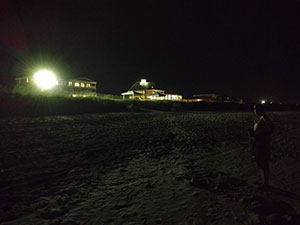
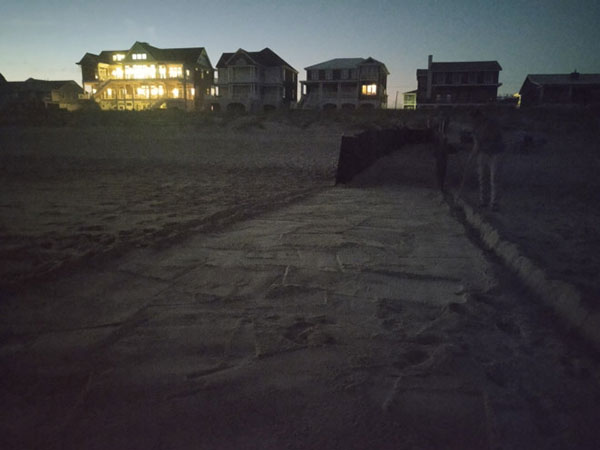
but window curtains would make a big difference.
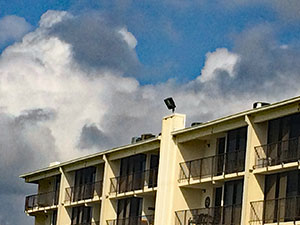
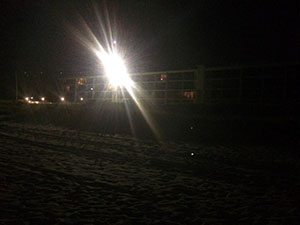
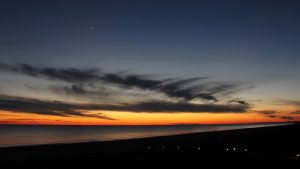
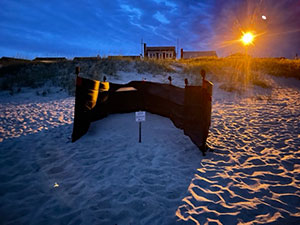
When the hatchlings emerge from their nest, they mainly use their sense of sight to orient towards the sea.
Hatchlings typically emerge after dusk and follow the brighter horizon which is normally the moon reflecting on the ocean surface.
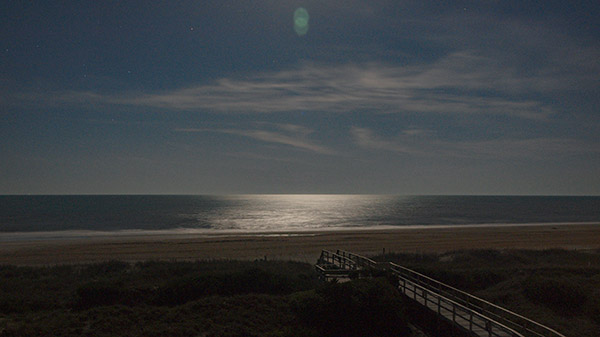
However, the moon is not always the brightest source of light. The two-inch-long hatchlings will crawl toward an artificial light source instead of the ocean. If hatchlings can’t orient to the ocean because of artificial lighting, they will continue to crawl in circles looking for the ocean until they fall prey to predators or succumb to dehydration. Hundreds of sea turtle hatchlings have died over the years in Atlantic Beach due to light pollution.
Light pollution for sea turtles is defined as any broad-spectrum artificial light that can be seen from the beach.
This includes ocean-facing porch lights, pathway lights, pool lights, flashlights, cell phones, and streetlights. Atlantic Beach has some of the highest beach light pollution per square area in North Carolina.
In addition, light pollution causes a loss of suitable nesting habitat for sea turtles because nesting mothers will generally choose darker beaches over more lit beaches. This is why we have had more nesting mothers choose to nest on Ocean Ridge (a mostly darkened stretch of beach) over the Atlantic Beach Circle area.
There have been rare nests close to the circle, however those hatchlings ended up in the street, ran over in parking lots at the circle, and fell into the storm drains and died.
Our volunteer group has experimented with various shade-cloths over the years in an effort to shield the nests from the light pollution that causes such harm. Pictured below is the pathway light of New Bern Beach Access. The light illuminates the beach all the way down to the water instead of being directed only on the pathway where it is needed. The shade-cloths help block out the light but have to be constantly managed by volunteers.
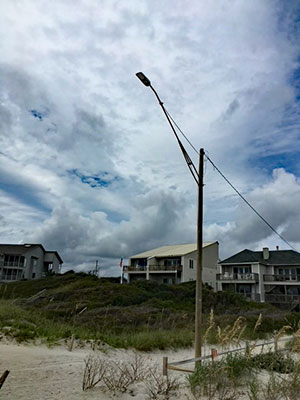
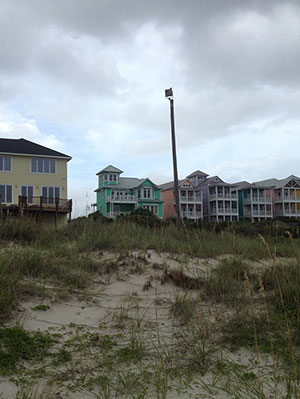
Beach access lights illuminating the beach instead of
being directed on the pathway
The combination of the costly shade-cloths and our diligent all-night efforts have yielded the successful nests that we have had.
One of the Atlantic Beach Sea Turtle Project’s Inc goals is to increase the nesting success of sea turtles by mitigating light pollution. We can do this by reducing unnecessary lights and retrofitting problem lights to sea turtle friendly lighting.
Sea turtle friendly lighting emits a narrow spectrum of light, compared to regular lighting which is a broad spectrum. The narrow spectrum of sea turtle friendly lights lessens the impact on nesting and hatching sea turtles. These lights when used properly can meet all regulations for human safety while minimizing the negative effects on wildlife.
Examples of Effective Sea Turtle Friendly Lighting Deployed in Jacksonville, Florida.
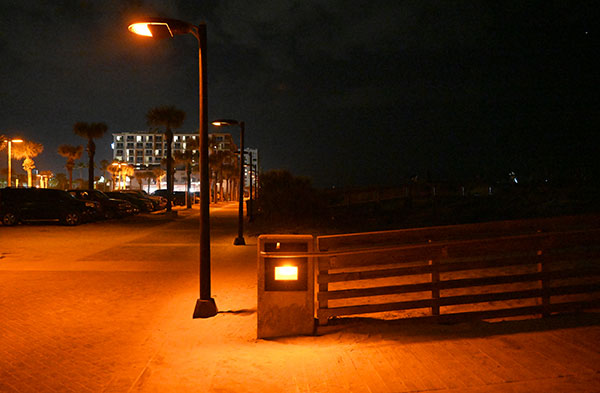
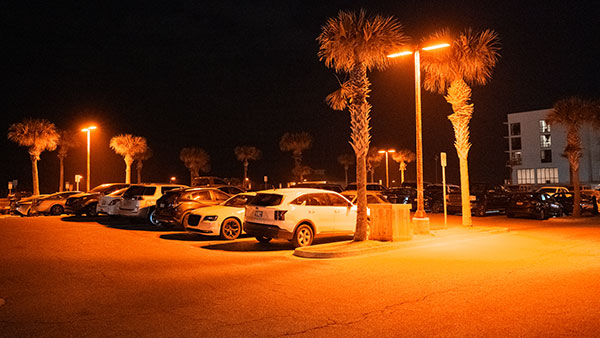


Easy ways you can help:
Flashlights and Cellphones:
If you are lucky enough to come across a nesting sea turtle or emerging hatchlings on the beach, while staying quiet and distant, turn off and put away all light emitting devices. Standard short wavelength white lights from flashlights, camera flashes and even cell phones are enough to scare a nesting mother away from laying eggs. Even your screen light on your smartphone and smartwatch are enough to misorient hatchlings.
Switching to a long wavelength turtle safe flashlight will help minimize your impact. Remember even if you encounter a sea turtle with your turtle safe light, don’t shine your light on the turtles as you can still disturb their natural process.
Residential Interior Lights:
Oceanfront residential owners and renters can play a role in reducing the effects of interior lights on sea turtles. The first way is to remove lights that have no purpose. Lights can also be switched off in rooms when they are not in use. For lights in ocean-facing rooms in use, closing the blinds or curtains at night can reduce the illumination on the beach. Window tinting is another option for windows with no blinds. Window tints will keep the owner’s beach view unaffected during the day and reduce visible light on the beach at night.
Residential Exterior Lights:
Oceanfront or close to oceanfront residential owners can greatly reduce the effects of their exterior lights on sea turtles. The first way is to remove lights that have no purpose. Exterior lights can be put on timers or motion sensors to lessen the time of their effects on the beach. Lights on the exterior of home or condo used to illuminate pathways and stairs can be switched to long wavelength wildlife-friendly bulbs and fixtures. Keeping light fixtures low to the ground or shielded toward the ground, where the light is needed, will help reduce the light that crosses the dunes and illuminates the beach.
Where you can obtain sea turtle friendly light fixtures and bulbs*:
Turtlesafe
– Flashlights
https://www.turtlesafeonline.com
Frontier Lighting
– Sea turtle lighting-LED bulbs-fluorescent bulbs-light fixtures
https://www.frontierlighting.com/index.jsp?path=seaturtles
Access Fixtures
– Turtle friendly 590nm lights
https://www.accessfixtures.com/a/application/turtle-friendly-lights/
VOLT Lighting
– Turtle safe lighting fixtures and best practices
https://www.voltlighting.com/learn/turtle-safe-lighting-best-practices
Visionnaire Lighting
– Turtle safe LED lighting
https://visionairelighting.com/solutions/turtle-safe-lighting/
BLUE SQUARE
– Turtle friendly pool lighting
https://www.bluesquaremfg.com/turtle-light/
Beachside Lighting
https://www.beachsidelighting.com/lighting-category/turtle-friendly/
Superior Lighting
– Turtle friendly light bulb
https://www.superiorlighting.com/7-watt-amber-led-a19-turtle-friendly-light-bulb-fwc-wildlife-lighting-certified/?gclid=Cj0KCQiAz9ieBhCIARIsACB0oGJGSge-lOfbED9c1IPUH4Z5aKXBgO0EWuIubw9riRyivxBsDN4rvkEaAqyqEALw_wcB
*NOTE: Links open in a new tab. ABSTP provides these links as a courtesy, but assumes no liability for the content, suitability and/or privacy policies.
How You Can Help – click here!
To Report a North Carolina Sea Turtle Stranding Emergency
Stranding Hotline: 252-241-7367
To Report Sea Turtle Nest Violations
Call NCWRC Hotline: 1-800-662-7137
